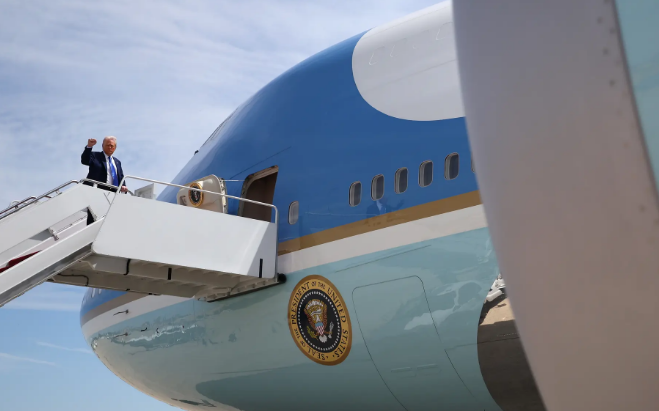Former President Donald Trump is facing renewed criticism over ethics and foreign influence after revealing plans to accept a luxury aircraft from the government of Qatar for temporary use as Air Force One during a fleet transition. The announcement, made ahead of Trump’s official visit to Qatar this week, has drawn bipartisan concern and reignited legal debates surrounding the U.S. Constitution’s Foreign Emoluments Clause.
The aircraft—a Boeing 747-8 valued at approximately $400 million and described as a “palace in the sky”—was offered by Qatar to be used by the Department of Defense and later displayed at Trump’s future presidential library. Trump defended the arrangement on Monday, calling it a “great gesture” and rejecting the idea of turning down a valuable gift. “I could be a stupid person and say, ‘No, we don’t want a free, very expensive airplane,’” he said.
But ethics experts say the situation is far more complicated. The Constitution prohibits federal officials from accepting gifts from foreign governments without congressional approval. Though Trump argues the plane is being given to the government, not to him personally, critics note the potential long-term benefits—especially if the aircraft ends up showcased at a Trump-affiliated library or museum.
“It’s no different than handing him $400 million and letting him decide what to do with it later,” said Robert Weissman, president of Public Citizen. Watchdog groups warn that such arrangements can blur the line between public service and private gain, especially in light of Trump’s ongoing business dealings in the Gulf.
Some Republicans have also expressed discomfort. Fox News host Brian Kilmeade questioned whether Qatar expected favors in return, while conservative commentator Laura Loomer called the optics “troubling.” White House Press Secretary Karoline Leavitt dismissed the concerns, saying, “President Trump only works with the interests of the American public in mind.”
The controversy comes as Trump is set to become the first U.S. president to visit Qatar since 2003. His relationship with the Gulf state has shifted significantly over time—from accusing Qatar of funding terrorism in 2017 to overseeing the end of a regional blockade against it in 2021. Meanwhile, the Trump Organization recently signed a deal to build a luxury golf resort in Qatar, its first international project since Trump’s return to office.
The move has stirred memories of Trump’s first term, when lawsuits and criticism over alleged violations of the emoluments clause dogged his administration. Those legal challenges were dismissed after he left office, but the constitutional questions remain.
As Trump moves closer to solidifying his legacy, the Qatar aircraft deal is likely to add fuel to ongoing concerns about foreign influence and personal enrichment during his presidency.









































